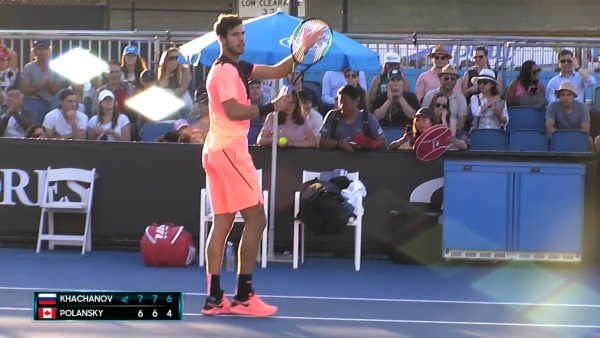AO19 Ones to Watch: Karen Khachanov
Court presence is hard to define but impossible to miss. Karen Khachanov has it.
At a commanding six feet six inches, the No.1 Russian powered to three title wins in 2018, finishing at a career-high No.11 in the rankings.
If AO2019 is the Grand Slam where the 90s generation breaks through, Khachanov is a leading contender.
The 22-year-old served notice in his last event of 2018, winning the Paris Masters with four straight upsets of top-10 opponents. No.9 John Isner, No.5 Alexander Zverev, No.8 Dominic Thiem and No.2 Novak Djokovic got a set between them.
“It’s [my] biggest achievement,” a collected Khachanov said in Paris. “And in general it’s a breakthrough season. Maybe I’m not crying but I’m really happy. I’m happy with the way I’m playing. Match by match, I was increasing my level. I think that’s what I showed against the top-10 guys.”
Khachanov notched five wins against the elite from 15 matches, having also beaten Isner in Toronto. But the quality of his losses arguably spoke loudest.
In each of the majors, it took heavy artillery to subdue him: Juan Martin del Potro at Melbourne Park, Alexander Zverev at Roland Garros in a tense fourth round that went the distance, eventual champion Djokovic in the last 16 at Wimbledon, and Rafael Nadal in a punishing US Open third round, in which the Russian led by a set and a break.
“After some tough losses against top guys like Rafa in New York, I think they push me to the limit and even to work harder,” Khachanov reflected in Bercy. “I saw that my level is there. I could play and compete on this level. So it was a matter of just a few points. If I continue to do the same things and [play] the way I was playing, it will turn around on my side. I was really believing this, and actually that's what I’ve got.”
Of his 22 losses last season, just four were to lower-ranked players, a clear marker of consistency and progress. Khachanov credits a return to Croatian coach Vedran Martic (former mentor to Goran Ivanisevic) at the start of 2018, and a mid-year training block ahead of the North American hardcourt swing, for his year-end surge.
“I just kept playing better and better. More consistent. That’s the first thing, I think, to be closer to top 10 and to finish top 10 - you need to play really consistent season. And that’s what I’m happy [about] and proud of.”
Khachanov is the first Russian to win a Masters title since Nikolay Davydenko in 2009 and the lowest ranked player (at No.18) since 2010. A particular thrill in winning Bercy was putting his name on the trophy alongside his childhood idol and three-time Paris winner, Marat Safin. It doesn’t take much joining of dots to see that Khachanov has some Safin swagger about him, not least the ready sense of humour. Among current players, he admires Del Potro (against whom he went 0-3 in 2018), another big man with bristling weapons.
All three of Khachanov’s title wins came at European indoor events. In October he was the first local since 2009 to win the Kremlin Cup in his native Moscow. His toughest win was against higher-ranked countryman and friend Daniil Medvedev in the semifinals, a dropped tiebreak his only lost set for the week.
At Marseille too, in his first title win for the year, Khachanov dropped just one set. Ranked 47, he finished with top-20 wins over Tomas Berdych and Lucas Pouille.
It leaves the big Russian with an imposing 4-0 record in ATP finals. “Honestly, it was in the back of my mind even today,” he said in Paris, of maintaining his perfect record even against an all-time great in Djokovic. “I was thinking, ‘Look, he has 70, 80 titles [actually 72]. I have three. But 3-0, you know?’”
Khachanov is also undefeated in five Futures deciders. Andrey Golubev is the only player to defeat him in a pro singles final, at Challenger level. All up, he’s 11-1 in career finals.
It’s a stat that reflects the big Russian’s thirst for big crowds and occasions. “I don’t mind about this attention,” he says of his increasing profile. “It feels different when the stands are full. You play better. These inexpressible emotions give you energy, motivate you.”
Nor is the big hitter impatient for the fabled Big Four to depart the stage. “It’s a privilege to still play at the same time,” he says, despite a 1-8 record against the greats.
As a junior, Khachanov absorbed all he could from watching the Big Four. And now, as a rising threat, what has he learned from those few rapid-fire points that separate victory from defeat?
“When you are younger and lower [ranked], you see more things,” he muses. “But when you are coming closer to them, maybe they don’t show as many things as before because you are becoming a tough and dangerous opponent for them.”
